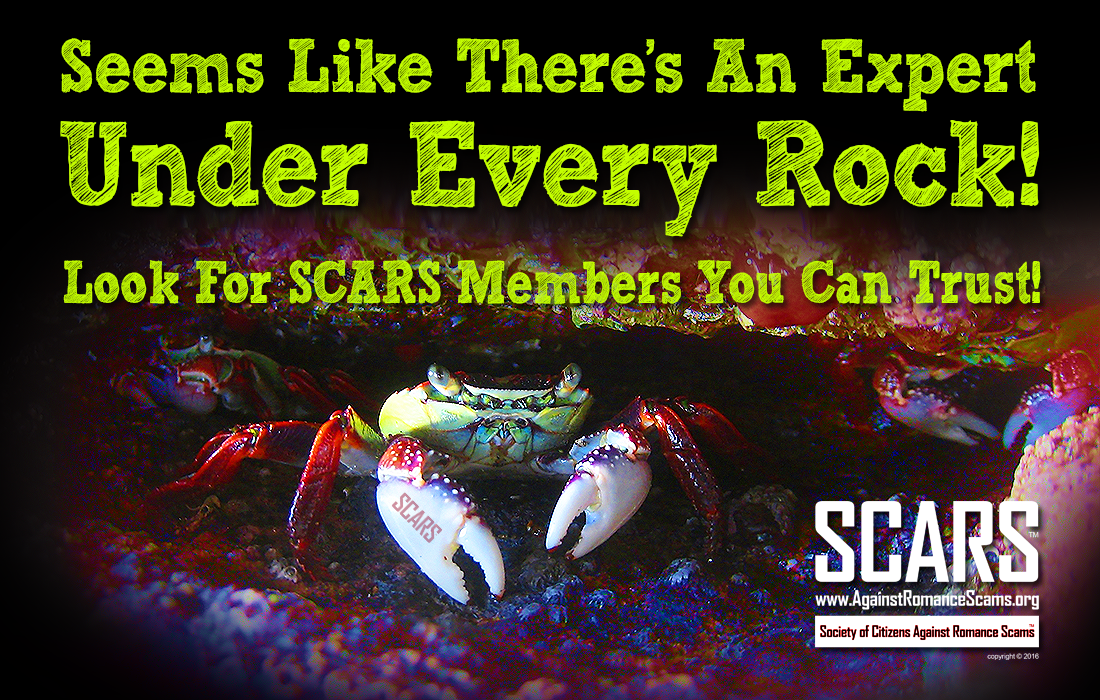
SCARS Institute’s Encyclopedia of Scams™ Published Continuously for 25 Years

Originally published 2016
Beware of Savior Victims
One of the things that happen to some victims is they develop a kind of messiah complex – a necessity or mania to help other victims – meaning they think that only they can save others. They become a kind of collectors going around and gathering other souls so they can save them.
They join anti-scam groups to “help” them but actually have no training in victims’ support or related fields, nor any experience in criminology. They are just manic victims that seek to control what happened to them by controlling the experiences of other victims. A savior complex.
From a psychological perspective, this zeal to be an expert and help others is often an avoidance mechanism. They are avoiding their own pain from grief or trauma – at least initially – by trying to control their situation by controlling others. However, after a while, this can become a permanently entrenched behavior.
Saviors are Dangerous to Other Victims
Sadly, they can be very dangerous for some victims since most of you are looking for help, and you may not yet know the difference between real assistance and further manipulation.
This is not the same thing as simply offering advice or support to another victim in need. A Savior almost demands that right to speak for their victims and have them listen to them. They can be very domineering and hostile to differing viewpoints.
They tend to have very narrow and highly vigilante-style approaches to helping others. There is their way, and everyone else is wrong.
Savior Complex
What Is The Savior Complex?
The savior complex is a psychological construct that makes a person feel the need to save other people. This person has a strong tendency to seek people who desperately need help and to assist them, often sacrificing their own needs for these people.
There are many sides to a savior complex and it has many roots. One of its fundamental roots appears to consist of a limiting belief the savior person has that goes something like this:
“If I always help people in need, I will get their love and approval, and have a happy life.”
This Is, of course, a Nice Sounding Fairytale
In our experience, a savior will have such an assertive way of helping others that instead of allowing others to make their own choice, they get used to it and they expect other victims to accept their help, and when rejected can become overtly hostile. They feel entitled to give help whether it is wanted or not, simply because they need to give it. So while they may feel happy because they are helping others, at some level, they feel bitter and frustrated at the same time.
They are not masochistic; they have another belief that even if being a savior will not get them the recognition they want and will not make them happy, it is the noble thing to do. They believe they are somehow better than others because they help people without getting anything back. It is common for them to disagree and try to convince victims that professional experience is somehow invalid, and that the savior knows best.
If you think you have a savior complex or at least something close to it, the best thing you can do is to face up to the practical consequences it has in your life. Being a savior is neither noble nor practical. Learn to give and to ask for what you want, to help and to be helped. This is a healthy way to use your people skills and to interact with others.
Real Victims’ Assistance
Our job, as a real crime victims’ assistance and support organization, is to do our best to keep this a safe environment for you. To offer real knowledge and information based upon our own years of experience as well as based upon professional standards & certificates. We understand where the thin gray line is between support and professional care, and recommend those in need to seek it.
Unfortunately, Saviors Do Not!
It is for this reason that we ban individuals that try to manipulate and “collect” other victims. Unfortunately, they are many and are out there trolling other anti-scam groups. In fact, some groups are founded by such people.
Real victims’ assistance and support is a professional practice that requires training and experience in a multitude of subjects. Many amateurs can actually be dangerous to traumatized victims. Sadly they don’t know that they don’t know and are so driven they will not listen to reason.
Please be careful about connecting with other victims, especially in your early stages. Share information only in secure groups and not by private messages.
Please trust that not every victim is stable yet, and a drowning person can pull you down just as easily. So, for now, please keep a distance and keep yourself safe.
If someone tries to contact you and ask you to communicate privately avoid them, decline and please let us know at once.
Thank you! Stay safe!
-/ 30 /-
What do you think about this?
Please share your thoughts in a comment below!
LEAVE A COMMENT?
Recent Comments
On Other Articles
- Arwyn Lautenschlager on Love Bombing And How Romance Scam Victims Are Forced To Feel: “I was love bombed to the point that I would do just about anything for the scammer(s). I was told…” Feb 11, 14:24
- on Dani Daniels (Kira Lee Orsag): Another Scammer’s Favorite: “You provide a valuable service! I wish more people knew about it!” Feb 10, 15:05
- on Danielle Delaunay/Danielle Genevieve – Stolen Identity/Stolen Photos – Impersonation Victim UPDATED 2024: “We highly recommend that you simply turn away form the scam and scammers, and focus on the development of a…” Feb 4, 19:47
- on The Art Of Deception: The Fundamental Principals Of Successful Deceptions – 2024: “I experienced many of the deceptive tactics that romance scammers use. I was told various stories of hardship and why…” Feb 4, 15:27
- on Danielle Delaunay/Danielle Genevieve – Stolen Identity/Stolen Photos – Impersonation Victim UPDATED 2024: “Yes, I’m in that exact situation also. “Danielle” has seriously scammed me for 3 years now. “She” (he) doesn’t know…” Feb 4, 14:58
- on An Essay on Justice and Money Recovery – 2026: “you are so right I accidentally clicked on online justice I signed an agreement for 12k upfront but cd only…” Feb 3, 08:16
- on The SCARS Institute Top 50 Celebrity Impersonation Scams – 2025: “Quora has had visits from scammers pretending to be Keanu Reeves and Paul McCartney in 2025 and 2026.” Jan 27, 17:45
- on Scam Victims Should Limit Their Exposure To Scam News & Scammer Photos: “I used to look at scammers photos all the time; however, I don’t feel the need to do it anymore.…” Jan 26, 23:19
- on After A Scam, No One Can Tell You How You Will React: “This article was very informative, my scams happened 5 years ago; however, l do remember several of those emotions and/or…” Jan 23, 17:17
- on Situational Awareness and How Trauma Makes Scam Victims Less Safe – 2024: “I need to be more observant and I am practicing situational awareness. I’m saving this article to remind me of…” Jan 21, 22:55
ARTICLE META
Important Information for New Scam Victims
- Please visit www.ScamVictimsSupport.org – a SCARS Website for New Scam Victims & Sextortion Victims
- Enroll in FREE SCARS Scam Survivor’s School now at www.SCARSeducation.org
- Please visit www.ScamPsychology.org – to more fully understand the psychological concepts involved in scams and scam victim recovery
If you are looking for local trauma counselors please visit counseling.AgainstScams.org or join SCARS for our counseling/therapy benefit: membership.AgainstScams.org
If you need to speak with someone now, you can dial 988 or find phone numbers for crisis hotlines all around the world here: www.opencounseling.com/suicide-hotlines
A Note About Labeling!
We often use the term ‘scam victim’ in our articles, but this is a convenience to help those searching for information in search engines like Google. It is just a convenience and has no deeper meaning. If you have come through such an experience, YOU are a Survivor! It was not your fault. You are not alone! Axios!
A Question of Trust
At the SCARS Institute, we invite you to do your own research on the topics we speak about and publish, Our team investigates the subject being discussed, especially when it comes to understanding the scam victims-survivors experience. You can do Google searches but in many cases, you will have to wade through scientific papers and studies. However, remember that biases and perspectives matter and influence the outcome. Regardless, we encourage you to explore these topics as thoroughly as you can for your own awareness.
Statement About Victim Blaming
SCARS Institute articles examine different aspects of the scam victim experience, as well as those who may have been secondary victims. This work focuses on understanding victimization through the science of victimology, including common psychological and behavioral responses. The purpose is to help victims and survivors understand why these crimes occurred, reduce shame and self-blame, strengthen recovery programs and victim opportunities, and lower the risk of future victimization.
At times, these discussions may sound uncomfortable, overwhelming, or may be mistaken for blame. They are not. Scam victims are never blamed. Our goal is to explain the mechanisms of deception and the human responses that scammers exploit, and the processes that occur after the scam ends, so victims can better understand what happened to them and why it felt convincing at the time, and what the path looks like going forward.
Articles that address the psychology, neurology, physiology, and other characteristics of scams and the victim experience recognize that all people share cognitive and emotional traits that can be manipulated under the right conditions. These characteristics are not flaws. They are normal human functions that criminals deliberately exploit. Victims typically have little awareness of these mechanisms while a scam is unfolding and a very limited ability to control them. Awareness often comes only after the harm has occurred.
By explaining these processes, these articles help victims make sense of their experiences, understand common post-scam reactions, and identify ways to protect themselves moving forward. This knowledge supports recovery by replacing confusion and self-blame with clarity, context, and self-compassion.
Additional educational material on these topics is available at ScamPsychology.org – ScamsNOW.com and other SCARS Institute websites.
Psychology Disclaimer:
All articles about psychology and the human brain on this website are for information & education only
The information provided in this article is intended for educational and self-help purposes only and should not be construed as a substitute for professional therapy or counseling.
While any self-help techniques outlined herein may be beneficial for scam victims seeking to recover from their experience and move towards recovery, it is important to consult with a qualified mental health professional before initiating any course of action. Each individual’s experience and needs are unique, and what works for one person may not be suitable for another.
Additionally, any approach may not be appropriate for individuals with certain pre-existing mental health conditions or trauma histories. It is advisable to seek guidance from a licensed therapist or counselor who can provide personalized support, guidance, and treatment tailored to your specific needs.
If you are experiencing significant distress or emotional difficulties related to a scam or other traumatic event, please consult your doctor or mental health provider for appropriate care and support.
Also read our SCARS Institute Statement about Professional Care for Scam Victims – click here to go to our ScamsNOW.com website.

















Thank you for your comment. You may receive an email to follow up. We never share your data with marketers.